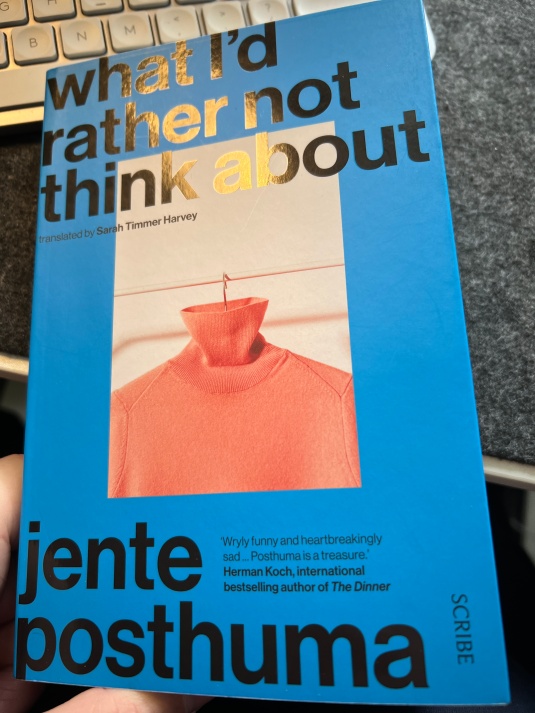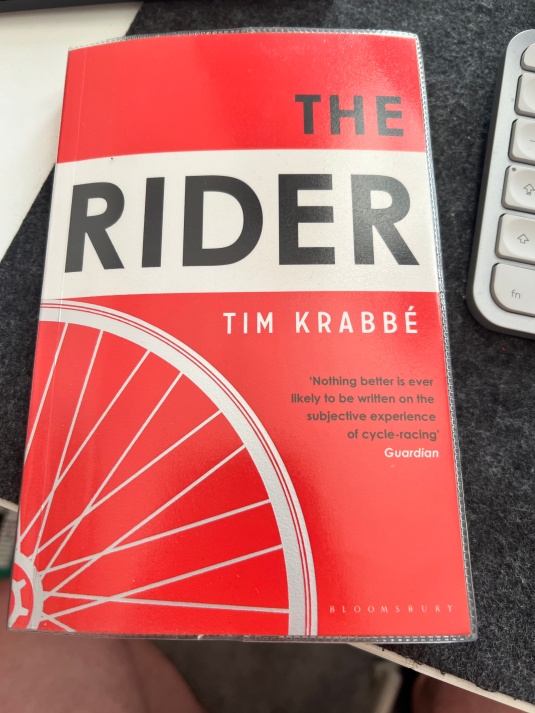What I’d rather not think about by Jente Posthuma
Dutch fiction
Original title Wear Ik Liver aniet aan denk
Translator Sarah Timmer Harvey
Source – personal copy
When the Booker International longlist came out I looked at the books, most I had a vague awareness of . But I read the small blurb on each and then set out on which order I’d read the longlist in part of this was decided by the arrival of the books on the longlist. This was one that I felt I’d get on with I love works told in Vignettes for they can work like a patchwork slowly building the picture of the book as a whole. Jente Posthuma’s first novel People Without Charisma was well-received and was up for several prizes in Holland when it came out. This is her second novel and deals with twins and the aftermath of when the older twin kills himself from his sister’s point of view.
MY Brother called himself one and Me two because he had been born forty-five minutes earlier than I was on a sweltering day in August. He treated me like his little sister, was longer and heavier than me at birth, and had taken up almost all the space in my mother’s belly. I’d been stuck behind him with my left leg thrown over my shoulder, or so the story goes. This was why it took a little extra time for me to emerge. Our actual due date had been a month later but my brother had gone ahead, and I wasn’t about to be left behind.
The fact that we weren’t identical was something I’d long considered a handicap, a consequence of our premature birth, even once I understood the difference between identical and fraternal twins. We could have grown even closer in that ninth month.
The names they used no identical but so close.
As many of you may know my own wife had to deal with the loss of a sibling to suicide it is one of the most heartbreaking things that can happen to a family and this is what ai had hoped to find here. But in a way I not sure if number two as we come to know her as the younger of the twins by some 45 minutes. There is a nod in a way here too the Twin Towers she says he was taller than me and always on the side like the Twin Towers. I felt this is written just after her brother has gone it jumps from their childhood, the discovery of each other sexuality. During those early relationships then her brother settles with a man and has a pair of dogs or as he calls them three and four. Things aren’t what they seem and in her brother’s case there always seems to be that dark spectre over his life. She maybe shows this at times with a lack of emotion I felt but that is maybe from my own personal experience of someone dealing for years with this grief.
The first sweater I bought with my own money was nice and warm and made of Icelandic wool. It wasn’t as soft as some of the sweaters I’d buy once I started working at the vintage shop, when one of my bedroom walls would gradually disappear behind a mountain of wool. I hung shelves from the floor to the ceiling and filled them with piles of sweaters, which, just like my father’s biscuit tins, were sorted according to colour. By my twenty-seventh birthday, I owned 142 sweaters, and it was high time I saw a therapist. What will you do with them all, my friends would say.It’s a collection, I’d tell them. I didn’t have any pets, so I stroked my sweaters whenever I had nothing else to do.
Two has her own issues as you see here.
I said I like vignettes as a style of telling stories and it does work here . I felt sometimes the fact it wasn’t from a real-life experience showed. There is a certain way of remembering and thinking of that event and then not happening the way when you are left after a suicide you always question the reasons motivation and what you as a sibling could have done differently. For me that is what was missing here maybe it is meant be just after he has died two thinking before the full horror or of the tidal wave of grief hits the sibling. I felt it had captured some of this but was maybe not realistic enough for me as someone who has been up in the night after night with my own darling wife as she had nightmares and questions about her own brother’s death. [art of the reason I read this early on is I wanted it to be read and gone as a book if that made sense well it does to me as the reader. Have you a subject you’d prefer not to read books around? or something that has effect your life and you find is never quite captured, right in fiction ?
Winstons score – B Well written but I just quite didn’t get it as a subject for me













